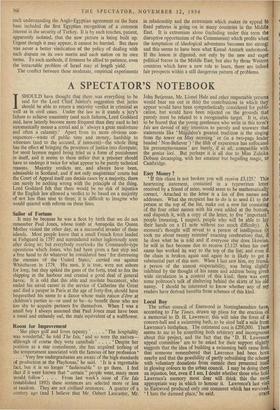A SPECTATOR'S NOTEBOOK
ISHOULD have thought that there was everything to be said for the Lord Chief Justice's suggestion that juries should be able to return a majority verdict in criminal as well as in civil cases. Under the law as it stands a jury's failure to achieve unanimity (and such failures, Lord Goddard said, have latterly become more frequent than they used to be) automatically means a retrial and is 'always a great misfortune and often a calamity.' Apart from its more obvious con- sequences—waste of public time and money, hardship to witnesses (and to the accused, if innocent)—the whole thing has the effect of bringing the processes of justice into disrepute; for most laymen regard being tried as a form of punishment in itself, and it seems to them unfair that a prisoner should have to undergo it twice for what appear to be purely technical reasons. Majority verdicts are, and always have been, admissible in Scotland; and if not only magistrates' courts but the Court of Appeal itself can decide cases by a majority, there can surely be nothing wrong with the principle of the thing. Lord Goddard felt that there would be no risk of injustice if the English law allowed a verdict to be based on a majority of not less than nine to three; it is difficult to imagine who would quarrel with reform on these lines.


































 Previous page
Previous page